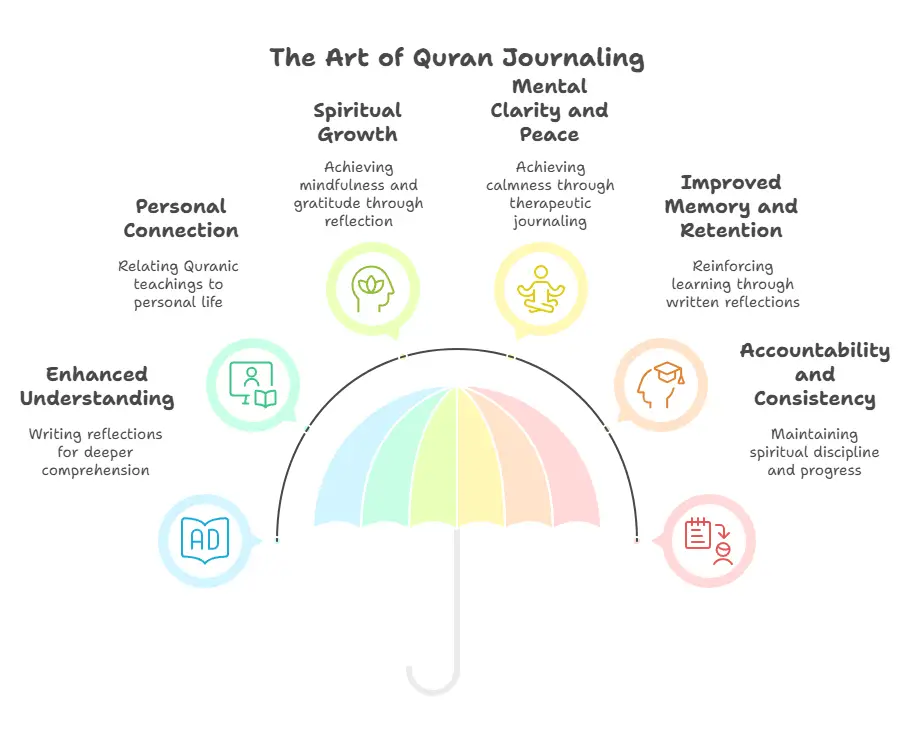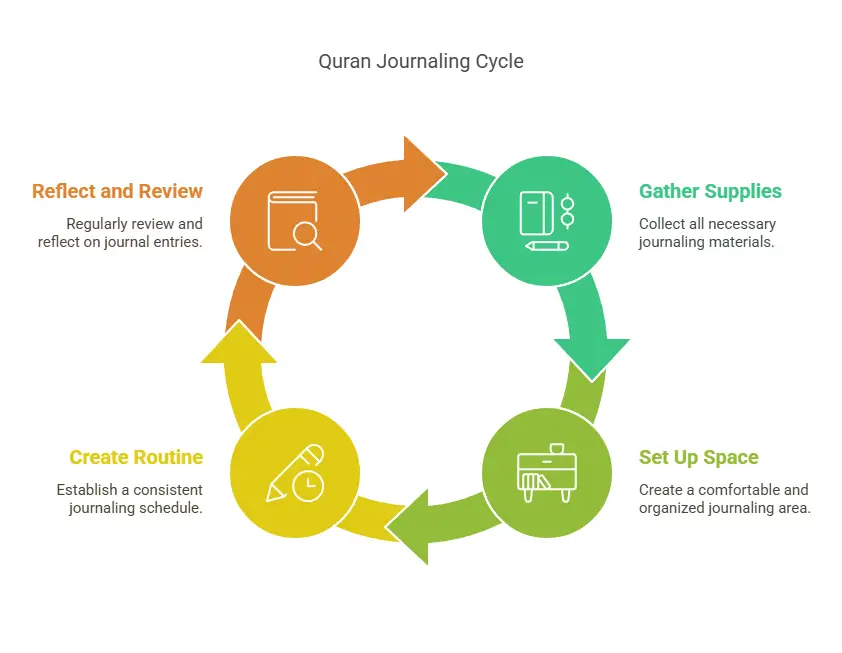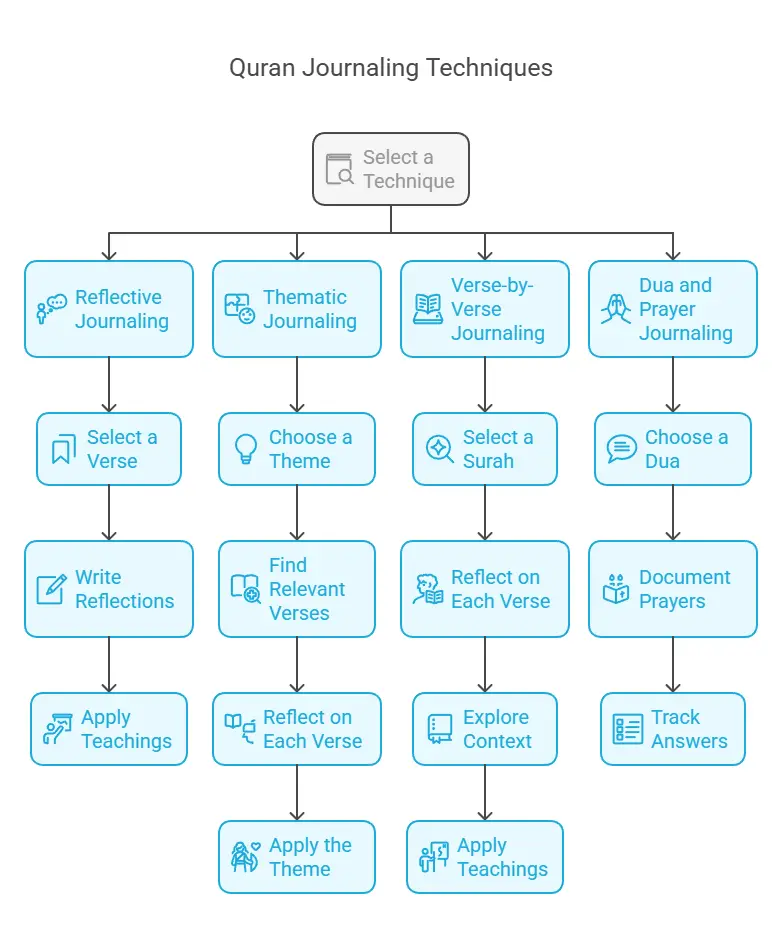
Quran journaling stands as a transformative practice because it enables individuals to strengthen their bond with the Quran while encouraging them to reflect on its teachings and utilize its wisdom in everyday life.
Whether you have years of journaling experience or you’re just beginning your journey, Quran journaling presents a distinct method to engage with the Quran on a personal level.
Our comprehensive guide will introduce you to different Quran journaling ideas and methods as well as provide prompts to kickstart your practice.
We’ll provide complete guidance on Quran journaling tools from artistic spreads to digital resources so you can integrate it into your spiritual path.
Now take your journal and let’s begin our journey into Quran journaling!
What is Quran Journaling?
Definition and Purpose
Quran journaling is a spiritual practice that involves reflecting on the Quranic text, writing down your thoughts, and applying its teachings to your daily life.
nlike traditional journaling, which may focus on personal experiences or daily events, Quran journaling is centered around the Quran itself.
t’s a way to engage deeply with the Quran, allowing you to explore its meanings, context, and relevance to your life.
The primary purpose of Quran journaling is to foster a deeper connection with the Quran.
By writing down your reflections, you can gain a better understanding of the verses, internalize their messages, and apply them in practical ways.
This practice not only enhances your knowledge of the Quran but also helps you grow spiritually and emotionally.
Benefits of Quran Journaling
Quran journaling offers a multitude of benefits that can enrich your spiritual and personal life:
- Enhanced Understanding: Writing down your reflections helps you delve deeper into the meanings of the Quranic verses. This practice encourages you to think critically and explore different interpretations, leading to a more comprehensive understanding of the text.
- Personal Connection: Quran journaling allows you to form a personal connection with the Quran. By reflecting on how the verses relate to your life, you can make the teachings more relevant and meaningful.
- Spiritual Growth: Regular Quran journaling can lead to significant spiritual growth. As you continuously reflect on and apply the Quranic teachings, you’ll find yourself becoming more mindful, patient, and grateful.
- Mental Clarity and Peace: The act of journaling itself can be therapeutic. Reflecting on the Quranic verses can bring mental clarity and peace, helping you navigate life’s challenges with a calm and focused mind.
- Improved Memory and Retention: Writing down your thoughts and reflections can help you better remember the Quranic verses and their meanings. This practice reinforces your learning and aids in long-term retention.
- Accountability and Consistency: Keeping a Quran journal encourages you to be consistent in your Quranic studies. It serves as a record of your progress and helps you stay accountable to your spiritual goals.
How Quran Journaling Differs from Regular Journaling
While both Quran journaling and regular journaling involve writing down your thoughts, there are several key differences between the two:
- Focus on Quranic Text: Quran journaling is specifically centered around the Quranic text. The primary focus is on reflecting on the verses, understanding their meanings, and applying their teachings. Regular journaling, on the other hand, may cover a wide range of topics, from daily events to personal thoughts and feelings.
- Spiritual Intent: Quran journaling is a spiritual practice aimed at deepening your connection with the Quran and enhancing your faith. Regular journaling may or may not have a spiritual component and can be more secular in nature.
- Structured Approach: Quran journaling often involves a more structured approach, with specific techniques such as reflective journaling, thematic journaling, and verse-by-verse journaling. Regular journaling is typically more free-form and can vary greatly depending on the individual’s preferences.
- Use of Resources: In Quran journaling, you may use additional resources such as tafsir (exegesis), Hadith, and scholarly commentaries to gain a deeper understanding of the verses. Regular journaling usually relies on personal experiences and thoughts without the need for external references.
- Purpose and Outcome: The ultimate goal of Quran journaling is spiritual growth and a deeper connection with the Quran. Regular journaling may have various goals, such as stress relief, self-expression, or personal development, but it doesn’t necessarily focus on spiritual outcomes.
In summary, Quran journaling is a unique and enriching practice that combines the benefits of traditional journaling with the spiritual depth of engaging with the Quran.
It’s a powerful tool for anyone looking to deepen their understanding of the Quran and enhance their spiritual journey.
Getting Started with Quran Journaling
Essential Supplies for Quran Journaling
To begin your Quran journaling journey, you’ll need a few essential supplies. These tools will help you create a meaningful and organized journaling experience:
- A Dedicated Journal or Notebook:
- Choose a journal that resonates with you. It could be a simple notebook, a beautifully designed journal, or even a bullet journal. The key is to have a dedicated space for your Quran reflections.
- Pens, Markers, and Highlighters:
- Use different colored pens, markers, and highlighters to make your journal visually appealing. Highlighters can be used to emphasize key verses or important points in your reflections.
- Stickers, Washi Tapes, and Decorative Elements:
- Adding stickers, washi tapes, and other decorative elements can make your journal more engaging and personalized. These can be used to create borders, highlight sections, or simply add a touch of creativity.
- A Quran Translation and Tafsir (Exegesis):
- Having a Quran translation in your preferred language is essential for understanding the verses. Additionally, a tafsir (exegesis) can provide deeper insights into the context and meanings of the verses.
- Index Tabs or Page Markers:
- Use index tabs or page markers to organize your journal. This can help you easily navigate to different sections, such as specific surahs, themes, or personal reflections.
- Ruler and Stencils:
- A ruler and stencils can help you create neat and organized layouts, especially if you’re incorporating art or calligraphy into your journal.
- Glue Stick or Tape:
- If you plan to add printed verses, images, or other materials to your journal, a glue stick or tape will be useful.
Setting Up Your Quran Journaling Space
Creating a dedicated space for Quran journaling can enhance your focus and make the experience more enjoyable. Here are some tips for setting up your journaling space:
- Choose a Quiet and Comfortable Spot:
- Find a quiet corner in your home where you can sit comfortably without distractions. This could be a cozy nook, a desk in your room, or even a spot in your local mosque.
- Ensure Good Lighting:
- Make sure your journaling space is well-lit. Natural light is ideal, but if that’s not possible, use a good desk lamp to avoid straining your eyes.
- Keep Supplies Organized:
- Have all your journaling supplies within reach. Use organizers, trays, or drawers to keep everything tidy and easily accessible.
- Create a Calming Atmosphere:
- Consider adding elements that create a calming atmosphere, such as a small plant, a diffuser with essential oils, or a piece of inspirational artwork.
- Minimize Distractions:
- Turn off your phone or put it on silent mode to minimize distractions. Let your family members know that this is your dedicated journaling time.
Creating a Quran Journaling Routine
Consistency is key to making Quran journaling a meaningful and transformative practice. Here’s how you can create a Quran journaling routine:
- Set a Specific Time:
- Choose a time of day that works best for you. This could be early in the morning, during your lunch break, or before bed. The important thing is to find a time when you can focus and reflect without interruptions.
- Start Small:
- If you’re new to Quran journaling, start with a manageable goal, such as journaling for 10-15 minutes a day. As you become more comfortable, you can gradually increase the time.
- Set Intentions:
- Before you begin, set an intention for your journaling session. This could be to gain a deeper understanding of a specific verse, to reflect on a particular theme, or to seek guidance on a personal issue.
- Use a Structured Approach:
- Follow a structured approach to your journaling. For example, you could start by reading a verse, then write down your reflections, and finally, apply the teachings to your life.
- Incorporate Variety:
- Keep your journaling practice interesting by incorporating different techniques and prompts. For example, one day you could focus on reflective journaling, and another day you could try thematic journaling or art journaling.
- Review and Reflect:
- Periodically review your journal entries to track your progress and reflect on your growth. This can help you stay motivated and see how far you’ve come.
- Stay Flexible:
- While consistency is important, it’s also essential to stay flexible. If you miss a day or two, don’t be discouraged. Simply pick up where you left off and continue your practice.
Quran Journaling Techniques
Reflective Journaling
Among Quran journaling techniques reflective journaling stands out as both widespread and effective.
Reflective journaling requires you to read a Quranic verse or passage followed by recording your personal thoughts and insights about it.
The approach promotes thorough contemplation and emotional engagement with the material.
How to Practice Reflective Journaling:
- Select a Verse: Choose a verse or a short passage from the Quran. It could be a verse that resonates with you, one that you find challenging, or one that you want to understand better.
- Read and Reflect: Read the verse carefully, perhaps multiple times. Reflect on its meaning, context, and how it applies to your life.
- Write Your Reflections: Write down your thoughts, feelings, and insights. Consider questions like:
- What does this verse mean to me personally?
- How can I apply this teaching in my daily life?
- What emotions does this verse evoke in me?
- Apply the Teaching: Think about practical ways to apply the verse’s teachings in your life. Write down any actions you plan to take or changes you want to make.
Example:
- Verse: “Indeed, with hardship comes ease.” (Quran 94:5)
- Reflection: This verse reminds me that no matter how difficult a situation may seem, relief is always on the way. It gives me hope during tough times and encourages me to remain patient and steadfast.
Thematic Journaling
Thematic journaling focuses on exploring a specific theme or topic within the Quran.
This technique allows you to delve deeply into a particular subject, such as patience, gratitude, or forgiveness, by examining multiple verses related to the theme.
How to Practice Thematic Journaling:
- Choose a Theme: Select a theme that you want to explore. It could be a virtue you want to cultivate, a challenge you’re facing, or a topic you’re curious about.
- Find Relevant Verses: Look up verses in the Quran that relate to your chosen theme. You can use a Quran concordance or an online search tool to find relevant verses.
- Reflect on Each Verse: Write down each verse and reflect on its meaning and relevance to the theme. Consider how the verses collectively provide guidance on the topic.
- Apply the Theme: Think about how you can incorporate the theme into your life. Write down practical steps or actions you can take to embody the teachings.
Example:
- Theme: Gratitude
- Verses: “And [remember] when your Lord proclaimed, ‘If you are grateful, I will surely increase you [in favor]…” (Quran 14:7)
- Reflection: These verses remind me of the importance of gratitude in attracting more blessings. I plan to start a daily gratitude practice, listing three things I’m thankful for each day.
Verse-by-Verse Journaling
Verse-by-verse journaling involves journaling about each verse in a specific surah (chapter) of the Quran.
This technique is particularly useful for gaining a comprehensive understanding of a surah and its teachings.
How to Practice Verse-by-Verse Journaling:
- Select a Surah: Choose a surah that you want to study in depth. It could be a short surah like Surah Al-Ikhlas or a longer one like Surah Al-Baqarah.
- Read and Reflect on Each Verse: Go through the surah verse by verse. Read each verse carefully, reflect on its meaning, and write down your thoughts and insights.
- Explore Context and Tafsir: Use a tafsir (exegesis) to understand the context and deeper meanings of the verses. Write down any additional insights you gain from the tafsir.
- Apply the Teachings: Consider how the teachings of each verse can be applied in your life. Write down any actions or changes you plan to make based on your reflections.
Example:
- Surah: Surah Al-Fatiha
- Verse 1: “In the name of Allah, the Entirely Merciful, the Especially Merciful.”
- Reflection: This verse reminds me to begin everything in the name of Allah, seeking His mercy and blessings. I plan to start my day by reciting this verse and setting a positive intention.
Dua and Prayer Journaling
Dua and prayer journaling involves incorporating your personal prayers and supplications into your Quran journaling practice. This technique allows you to document your prayers, reflect on their meanings, and track how they are answered over time.
How to Practice Dua and Prayer Journaling:
- Choose a Dua or Prayer: Select a dua or prayer from the Quran or Hadith, or write your own personal supplication.
- Reflect on the Meaning: Write down the dua or prayer and reflect on its meaning. Consider why you are making this supplication and what you hope to achieve.
- Document Your Prayers: Keep a record of your prayers, including the date and any specific intentions or requests.
- Track Answers and Reflections: Periodically review your prayers and note any answers or changes you’ve observed. Reflect on how your faith and understanding have grown through this practice.
Example:
- Dua: “My Lord, increase me in knowledge.” (Quran 20:114)
- Reflection: This dua reminds me of the importance of seeking knowledge. I plan to make this dua regularly and take concrete steps to increase my knowledge, such as enrolling in a course or reading a new book.
Conclusion
Quran journaling is more than just a creative outlet; it’s a spiritual practice that can transform your relationship with the Quran.
By reflecting on its teachings, applying its wisdom, and documenting your journey, you can experience profound personal and spiritual growth.
Whether you’re journaling alone or with your family, the key is to stay consistent and open to the lessons the Quran has to offer.
So, grab your journal, pick up your Quran, and start your journaling journey today. Share your experiences with others and inspire them to embark on their own Quran journaling adventure.
FAQs
- What is Quran journaling?
Quran journaling is the practice of reflecting on Quranic verses, writing down your thoughts, and applying the teachings to your life. - How do I start Quran journaling?
Start by gathering essential supplies, setting up a quiet space, and creating a routine. Use prompts and techniques to guide your reflections. - What are some creative Quran journaling ideas?
Incorporate art, calligraphy, mind maps, and decorative elements like stickers and washi tapes into your journal. - Can Quran journaling help with mental health?
Yes, Quran journaling can be therapeutic, helping to reduce stress, anxiety, and depression by providing comfort and peace through reflection. - Is digital Quran journaling effective?
Digital Quran journaling offers convenience and multimedia integration, but some prefer the tactile experience of traditional journaling.
We’d love to hear about your Quran journaling journey! Share your experiences, tips, and creative ideas in the comments below.
Don’t forget to share this article with your friends and family to inspire them to start their own Quran journaling practice. What’s your favorite Quran journaling technique? Let us know!






